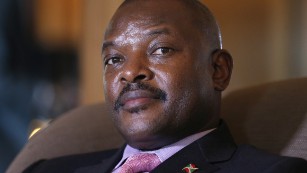People dragged from their homes and killed in the night. Bodies littering the streets of the capital at dawn. An attack on an army barracks. A President whose third term is viewed by many as unconstitutional.
All this amid a history of horrible ethnic warfare.
These are frightening times in the central African country of Burundi. Lurking always in the background is the possibility of widespread ethnic violence and even regional instability.
And one resident of the capital, Bujumbura, made an emotional plea Wednesday to the international community.
“How many people must die before you help stop the killings?” Nsengiyumva Pierre Claver, a former EU elections observer, asked in an interview with CNN.
President takes third term despite constitution
Burundi is a tiny landlocked country in the Great Lakes region, bordered by the Democratic Republic of the Congo on the west, Rwanda to the north, and Tanzania to the east and south. It’s about the size of Belgium.
The current instability began earlier this year when President Pierre Nkurunziza said he would run for a third term. This seemed a clear a violation of both the agreement that ended the country’s civil war and the country’s constitution.

Protesters took to the streets. Police fired on them with live ammunition, killing a number of them.
In May, an attempted coup was beaten back. In July, Nkurunziza was re-elected.
Now, in the view of many observers, opponents of the President are being subjected to extrajudicial assassinations.
But the protests have continued.
A history of ethnic civil war
Last week, an army barracks in Bujumbura was attacked. Following that attack, at least 87 people, reportedly including four police officers and four soldiers, were killed.
And the bodies started turning up in the streets in greater numbers.
“There were corpses in the road of young people who were dragged off their beds and killed,” said Claver, the former elections observer.
Urgent action needed to prevent descent into catastrophic violence in Burundi https://t.co/xSL0R4IlVr #burundicrisis pic.twitter.com/NB1c6umcwL
— UNICEF (@UNICEF) December 15, 2015
o far, the violence has been fueled by politics. But Claver and others fear a return to ethnic violence.
Should Nkurunziza feel under too much threat, the last card he will have to play, Claver said, will be to call Hutus to stand in solidarity with him — to cast the conflict in ethnic rather than political terms.
And ethnic tension lies close to the surface in Burundi.
The country’s civil war, which lasted from 1993 until 2003, was driven by hatred between Hutus and Tutsis. An estimated 300,000 people were killed in the country of 10 million residents.
The ethnic makeup of Burundi is similar to that of Rwanda — a Hutu majority, a Tutsi minority.
In the 1994 Rwandan genocide, an estimated 800,000 Tutsis and moderate Hutus were slaughtered in the course of 100 days.
Any ethnic conflict in Burundi could possibly spread in the region — inciting passions among ethnic relatives in neighboring countries.
Flows of refugees might provoke further regional instability.
Claver said the prospects for peace seem to recede by the day.
“Now it’s really difficult to see whether a return to peace is possible in the immediate future,” he said.
As reported by CNN
